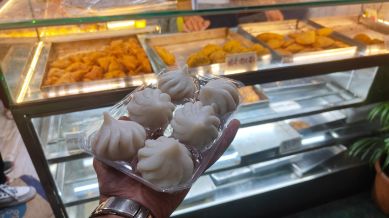Click here to join Express Pune WhatsApp channel and get a curated list of our stories
Pune on My Plate | Soft handmade ones, gold-plated or Konkani style: like Bappa, the city’s love for modaks is unwavering
From Modak Ghar’s factory churn to Godbole’s homely kitchen, Gaurav Snacks’ year-round presence and Chitale Bandhu’s export legacy, Pune’s modak story is layered with devotion, entrepreneurship, and cultural pride.

Written by Viraj Mandar Paranjape
If Ganpati Bappa loves modaks, Punekars are not far behind. Around the time of the annual Ganesh festival, the city’s lanes fill with the aroma of steaming ukadiche modaks, the sweet dumpling that has become both an offering and indulgence. From household kitchens to bustling mithai shops, the city has embraced this delicacy in countless forms — soft and handmade, machine-perfect, or innovatively flavoured — but always tied to devotion and nostalgia.
monthly limit of free stories.
with an Express account.
If Pune has a modern face for the modak, it is Modak Ghar. Founded in 2009 by the Medhi family, the enterprise began with a humble order of 800 modaks for the entire 10-day duration of the festival — only half of which they could deliver. Today, with a factory of 40 workers, Modak Ghar can churn out 800 modaks – costing Rs 40 apiece – every 30 minutes. Their Konkani-style handmade authenticity has earned them a special place, with modaks offered at Pune’s revered five Manache Ganpatis.
Owner Akash Medhi recalls one loyal customer who has ordered 1,001 modaks every year since 2015, distributing them across city mandals. For many customers, trust has been the defining factor. A city resident shares: “I am their long-time customer; I don’t even think twice before buying modaks from them. I have even told them to add more products along with modaks.”
With fresh coconuts sourced from Kerala and hygiene maintained with gloves and caps, Modak Ghar sells nearly 2 lakh modaks daily during the peak of the festival, while also catering to year-round demand.
Homely touch: Godbole Modaks
In contrast, Godbole Modaks tells a story of homegrown simplicity. Started by Jyoti Godbole in 2006, the brand carries the fragrance of cardamom and the ethos of tradition in every 80-gram ukadiche modak that costs Rs 30. On weekends, orders average 400–500, while during Ganeshotsav, the number rises to nearly 10,000. Families such as the Tilaks and PNG Jewellers count among their loyal patrons.
Despite rising coconut prices and surging demand, Jyoti has chosen quality over unchecked expansion. “All customers are now like family. I only want my modaks to reach everyone’s Bappa,” she says. A customer’s words echoes this bond: “We are happy even if we get modaks in the last rush hour. They take their orders a month in advance, and still, if we manage to get some, it is a complete joy.”
Everyday modaks: Gaurav Snacks
If others’ modaks mark the festival, Gaurav Snacks make it an everyday indulgence. Started in 2000 by brothers Rahul and Manoj Vyawhare, the eatery – now managed by Swati Vyawhare – sells about 350 modaks daily, costing Rs 35 each, surging to nearly 7,000 during Ganeshotsav. Offering both fried and steamed versions, their modaks have a loyal base of Punekars who come back for the “same taste, year after year.”
One customer tells The Indian Express: “Their modaks remind me of my grandmother’s — the same taste, the same comfort.” Along with modaks, Gaurav’s cheeseballs and karanjis also enjoy loyal followings, making the eatery a constant in Pune’s festive map.
The legacy: Chitale Bandhu
And then there is Chitale Bandhu Mithaiwale — a name synonymous with Pune mithai. Established in 1950, the brand began with milk products before gifting the city bakarwadi. In the 1960s, they launched their iconic khawa modak, swapping grated coconut with khawa for a new taste. Today, Chitale offers nine varieties, from delicate 13-gram modaks to jumbo one-kilo versions wrapped in silver varkha.
Unlike others, Chitale relies entirely on machines to ensure consistency and hygiene. Their nitrogen packaging allows modaks to stay fresh for a month, making it possible to export Pune’s festive sweets to other parts of India and abroad. “This year, we are selling more than 20 types of modaks — from fresh steamed to even gold-plated varieties. Packaged modaks now have a shelf life of up to 180 days,” says Indraneel Chitale, partner at Chitale Bandhu.
He adds that modaks have gone truly national and global, sold across India via Chitale stores, general trade, modern trade, and even 10-minute quick-commerce deliveries in major cities. “We are seeing strong adoption and demand both nationally and globally, thanks to omni-channel presence. Our exports now reach over 65 countries,” Indraneel noted.
From Modak Ghar’s factory churn to Godbole’s homely kitchen, from Gaurav Snacks’ year-round presence to Chitale Bandhu’s export legacy, Pune’s modak story is layered with devotion, entrepreneurship, and cultural pride. For Punekars, the first bite of a modak during Ganeshotsav is not just about sweetness. It is about memory, tradition, and a reaffirmation of their bond with Bappa.
Viraj Mandar Paranjape is an intern with The Indian Express.
Click here to join Express Pune WhatsApp channel and get a curated list of our stories